How to Format BitLocker Drive/USB/SD Card With or Without Password
This page explains the concept of a BitLocker partition, the necessity of formatting a BitLocker drive, and how to easily format a BitLocker drive, USB, or SD card on Windows 10/8/7 computers.
The issue with the content on this page is that it's not navigable. However, I can provide a quick navigation of the content to help you find fixes for this issue immediately.
PAGE CONTENT:
- BitLocker Drive Overview
- Part 1. Check BitLocker Drive State
- Part 2. Unlock BitLocker Drive Before Formatting
- Part 3. Format BitLocker Drive on Windows 10/8/7 (4 Methods)
BitLocker Drive Overview
Before getting started, it's helpful to know that formatting a Bitlocker drive requires some preparation. First, you'll need to know that Bitlocker is a full-disk encryption feature that can be enabled on Windows systems.
1. What is BitLocker?
2. What can BitLocker drive do?
BitLocker is a volume encryption feature included in Windows versions starting with Windows Vista, designed to protect data by providing encryption for an entire volume.
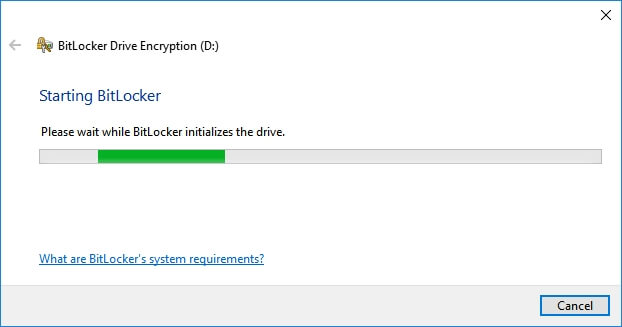
When enabling BitLocker on a device, Windows encrypts the data stored on it, allowing only authorized users to access it.
Can I Format a BitLocker Encrypted Hard Drive
If you've lost the BitLocker password and recovery key, you can't access the encrypted data. However, you can try to recover the data using a third-party tool, such as BitLocker Recovery Tool or a professional data recovery service. These tools can help you recover the data without needing the password or recovery key. It's worth noting that using a third-party tool may void the warranty of your external hard drive, and it's always best to try to recover the data with the manufacturer's support.
Unfortunately, it's not possible to format a BitLocker drive and make it usable again. BitLocker is a full-disk encryption feature that encrypts the entire drive, and formatting the drive would erase the encryption key, making it impossible to access the encrypted data. Once a BitLocker drive is encrypted, it's best to recover the data from a backup or use a professional data recovery service, as formatting the drive will result in data loss.
A: When you've enabled or locked BitLocker on a drive, USB, or SD card, you can format it yourself.
Formatting or wiping a hard drive is usually a straightforward process, but things become more complicated if the drive is encrypted with Windows BitLocker.
If you're trying to format a BitLocker-encrypted drive, you'll need to follow these steps to restore it to its normal state: First, unlock the drive by entering the correct password or recovery key. Once unlocked, you can then proceed with formatting the drive as you normally would.
#1. Check BitLocker Drive State - Locked or Unlocked
#2. Unlock BitLocker Encrypted Drive
#3. Format BitLocker Drive with 4 Methods
Part 1. Check BitLocker Drive State - Is The Drive Locked or Unlocked
Before you start, open Windows File Explorer to check the state of your BitLocker encrypted drive first. This will give you an idea of whether the drive is properly unlocked, locked, or if there's an issue with the encryption.
Case 1. BitLocker drive is locked
If your BitLocker drive or USB is encrypted with a golden lock icon, it's locked and needs to be unlocked before you can format it.
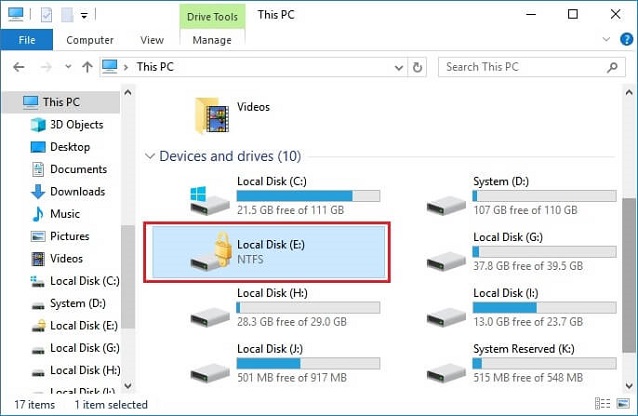
Case 2. BitLocker drive is unlocked
If your BitLocker drive is unlocked with a blue lock icon, it means your drive data is visible and editable, allowing you to access and even modify saved files, including the drive itself.
When your BitLocker drive is unlocked, you can skip to Part 3 and use one method to format the drive right away.
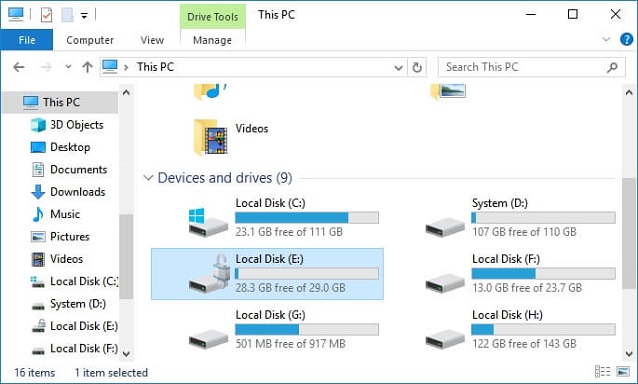
IMPORTANT: If you have important data on a BitLocker-encrypted hard drive or external device like a USB, SD card, unlock the drive first and back up your data to a safe location before proceeding.
Part 2. Unlock BitLocker Drive Before Formatting
When your drive is encrypted by BitLocker password, you need to unlock it first. This is because once the drive is locked, Windows alters the disk's file system parameters, directory entries, and other crucial settings.
To unlock a BitLocker hard drive or USB, SD, you'll need to access it, except for Windows itself, no other software can recognize and access the drive. There are two ways to unlock it, which you'll learn about in this part.
Way 1. Unlock BitLocker Drive with Password
Step 1. Open Windows File Explorer and locate the BitLocker encrypted drive.
Step 2. Double-click the BitLocker drive or external drive, enter your password in the pop-up window.
Step 3. And click "Unlock" to unlock the drive.
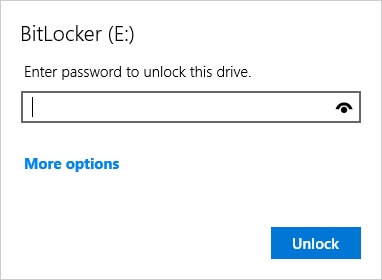
Now, you can access the drive and manage everything in the BitLocker drive without any problem.
Way 2. Run Clean Command to Clear BitLocker Encryption (without Password)
If you've forgotten the recovery key or password for your BitLocker-encrypted drive, you can use the "clean" command in DiskPart to remove the encryption, effectively bypassing the need for the recovery key or password. This approach may erase all data on the drive, so be sure to back up any important files before proceeding.
If you're unable to access your encrypted drive, try using a password recovery tool or contacting the manufacturer for assistance. If you're unable to recover your password, you may need to re-encrypt the drive using a new password. However, this will erase all data on the drive.
Do it carefully:
Step 1. Type cmd in Windows Search and right-click on Command Prompt and select "Run as administrator".
Step 2. Type diskpart and hit Enter.
Step 3. Type the following commands and hit Enter each time:
- list disk
- select disk *
- list partition
- To select a specific partition, you can use the `select partition *` command, replacing the asterisk (`*`) with the label of the partition you want to access. For example, if you have a BitLocker drive or USB with a partition labeled "Secure", you would use `select partition Secure`.
- delete partition overrride
Step 4. Type exit to close diskpart window.
Now, you can create a new partition on the unallocated space and format it to NTFS for saving data again.
Way 3. Turn to 1-0n-1 Remote Assistance Service Provided by Qiling
Qiling support team offers a 1 on 1 remote assistance service to help with unlocking BitLocker drives, providing an additional resource for those experiencing difficulties.
Part 3. Format BitLocker Drive on Windows 10/8/7 (4 Methods)
I'm happy to help! However, I need a bit more information from you.
1. Qiling partition tool (easiest)
2. Windows File Explorer (Beginners)
3. Disk Management (Experienced Users)
4. CMD Format Command (Professionals)
Fix 1. Format BitLocker Encrypted Drive Using Qiling Partition Tool
Qiling partition tool is a versatile disk formatting tool that allows users to format various storage devices such as hard drives, USB flash drives, and SD cards to different file systems like FAT32, NTFS, and FAT, making it a useful tool for all levels of Windows users to manage partitions on internal and external storage devices.
To format a BitLocker drive after unlocking it, you can follow these steps: First, unlock the drive by entering the correct password or recovery key. Once unlocked, you can format the drive by right-clicking on the drive in File Explorer, selecting "Format," and then choosing the desired file system (e.g.
Step 1: Launch Qiling Partition Master
On the Disk management window, select the partition on your hard drive or external storage device and click "Format".
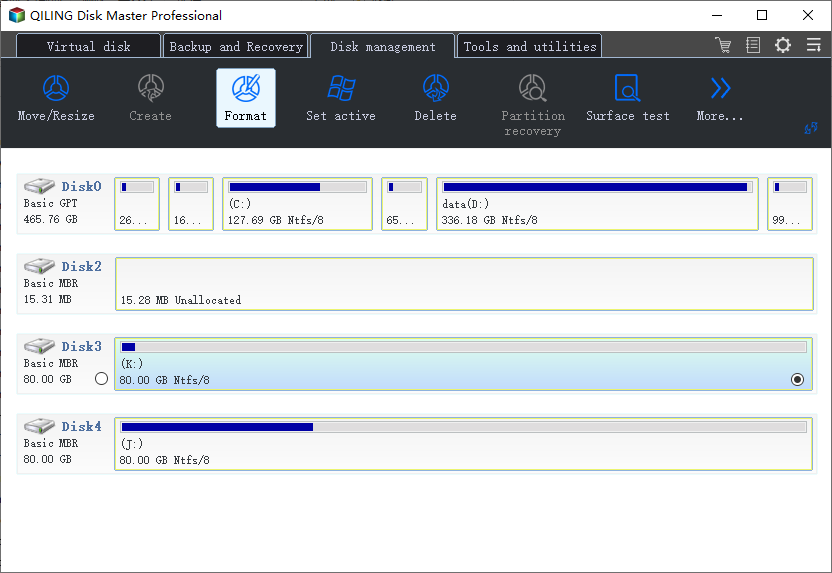
Step 2: Adjust the new partition size, file system, label, etc.
To create a new partition, select the desired size, assign a partition label, and choose a drive letter, file system, and other settings as needed. Then, click the "Proceed" button to initiate the partitioning process.
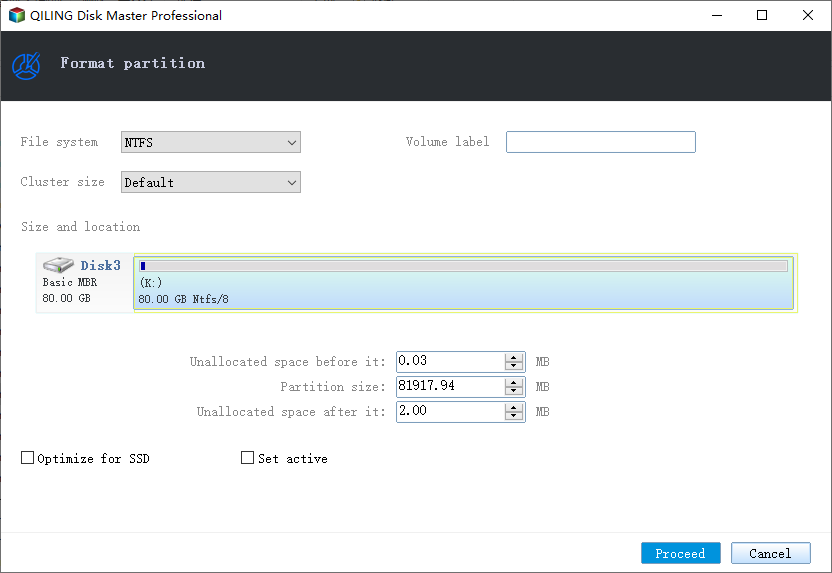
Fix 2. Format with File Explorer
Step 1. Connect your BitLocker drive to PC if it's an external storage device.
Step 2. Open Windows File Explorer and right-click on the BitLocker drive, select "Format".
Step 3. Tick "Quick Format" on the format window, set the file system to NTFS for an internal hard drive, FAT32 for USB/SD smaller than 32GB, or exFAT for big external drives, and click "Start".
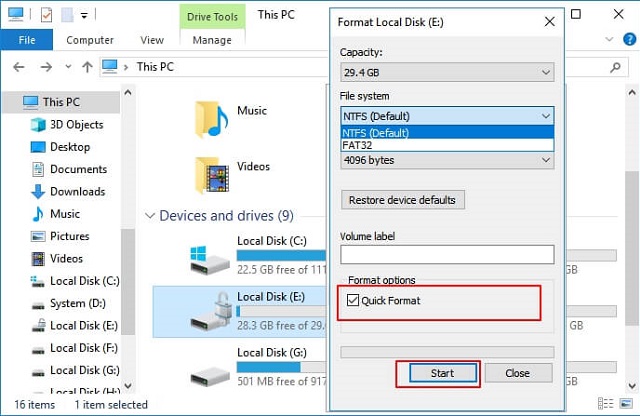
1. Wait for the process to complete, you can now use it as a normal data drive again.
Fix 3. Format BitLocker Encrypted Drive Using Disk Management
Step 1. Type Control Panel in the search box. And click "Control Panel".
Step 2. Click "Administrative Tools" > "Computer Management" > "Disk Management".
Step 3. Right-click on the drive or partition and click on "Format".
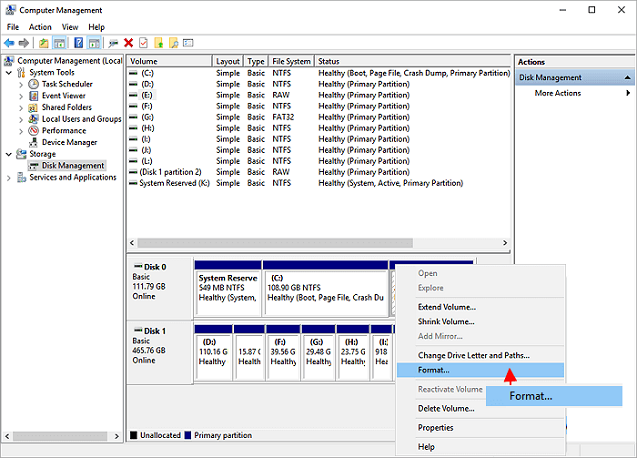
Step 4. Select the file system and set the cluster size.
Step 5. Click "OK" to format the BitLocker encrypted disk, USB flash drive, or SD card.
Fix 4. Format BitLocker Drive in DiskPart with Format Command
Step 1. Type cmd in the Search box, right-click Command Prompt, and select "Run as administrator".
Step 2. Type diskpart and hit Enter.
Step 3. Type the following commands and hit Enter each time to format BitLocker drive:
- list disk
- select disk *
- list volume
- select volume *
- format fs=ntfs quick
Step 4. When DiskPart tells the format has completed, type exit and hit enter to close DiskPart.
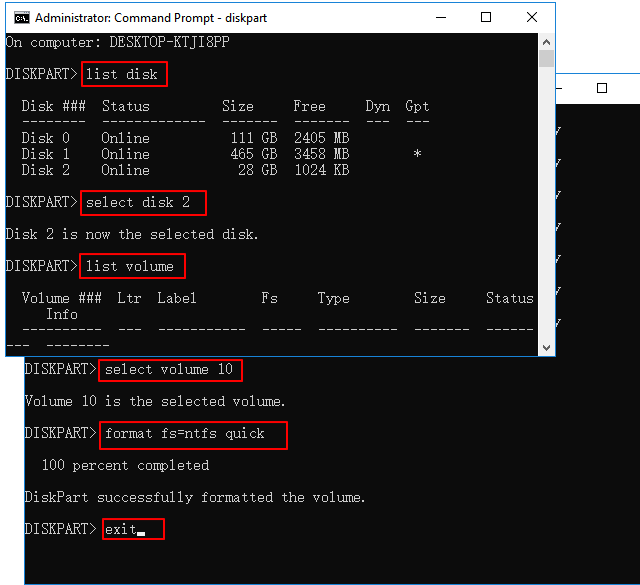
Now, you can save files to the drive again.
Bonus Tip 1: How to Remove BitLocker from Hard Drive/USB/SD Card
To resolve the "Windows cannot be installed to this hard disk space. Bitlocker drive encryption is enabled" error message when trying to install Windows on a Bitlocker-encrypted drive, you can try disabling Bitlocker encryption. This can be done by going to the Control Panel, then to Bitlocker, and following the prompts to disable it. Alternatively, if you're not comfortable disabling Bitlocker, you can also try creating a new partition on the drive and installing Windows on that partition instead. This will allow you to keep the existing data on the encrypted drive intact, but install Windows on a separate, unencrypted partition.
To resolve the issue, you can turn off Bitlocker and decrypt the drive by following these steps: disable Bitlocker, decrypt the drive, and then re-enable Bitlocker. This process will allow you to access your data again.
To unlock your BitLocker drive, you need to use your password first if it's currently locked.
Step 1. Go to Control Panel on your computer. Click on "BitLocker Drive Encryption".
Step 2. To decrypt a Bitlocker-encrypted drive, find the drive, select "Turn Off BitLocker", and wait for the decryption process to complete.
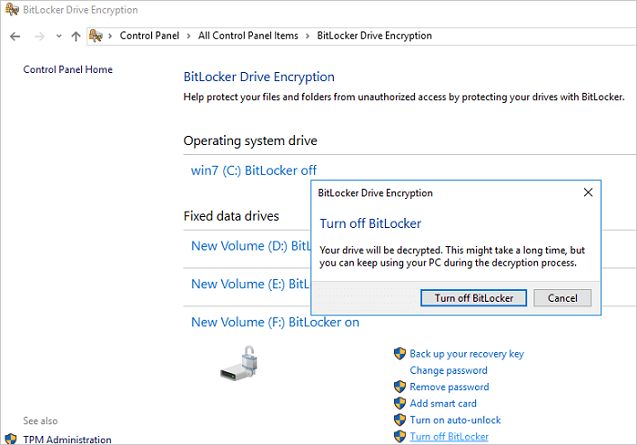
Bonus Tip 2: Recover Files from Formatted BitLocker Encrypted Drive
Currently, there is no third-There are no party software or solution on the market that can recover files from formatted BitLocker encrypted hard drive. However, you can recover files from a formatted hard drive that is not encrypted with a data recovery software, like Deep Data Recovery.
If you fail to back up data and instead format a BitLocker drive, deep data recovery software is your best chance. This top-notch file recovery tool allows you to recover lost and deleted, even permanently deleted files from various storage devices including HDD, SSD, USB flash drive, pen drive, SD card, and external hard drives.
Let's see how to recover data after formatting BitLocker drive:
To increase the chances of successful data recovery, consider installing a deep data recovery software on a separate disk drive, rather than the one that has been formatted. This approach can help ensure the integrity of the recovery process.
Step 1. Launch Deep Data Recovery on your computer. Run it and click "Next".
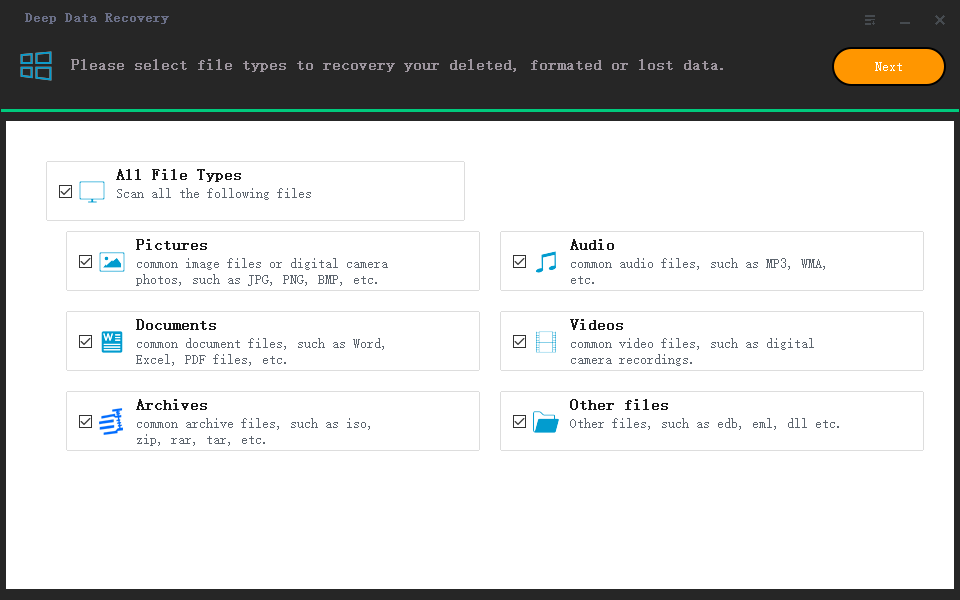
Step 2. Choose the hard drive partition which you've accidentally formatted and click "Scan".
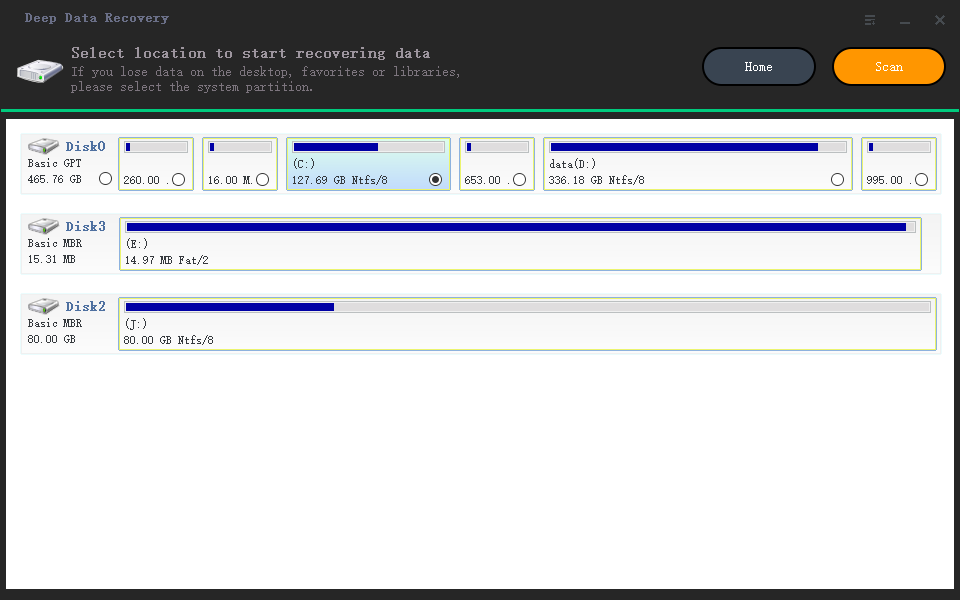
Step 3. After scanning, click "Filter" to quickly find specific file types. Then, use the left pane to search for files using options like "Other Lost Files", "Files Lost Original Name", or "Tags".
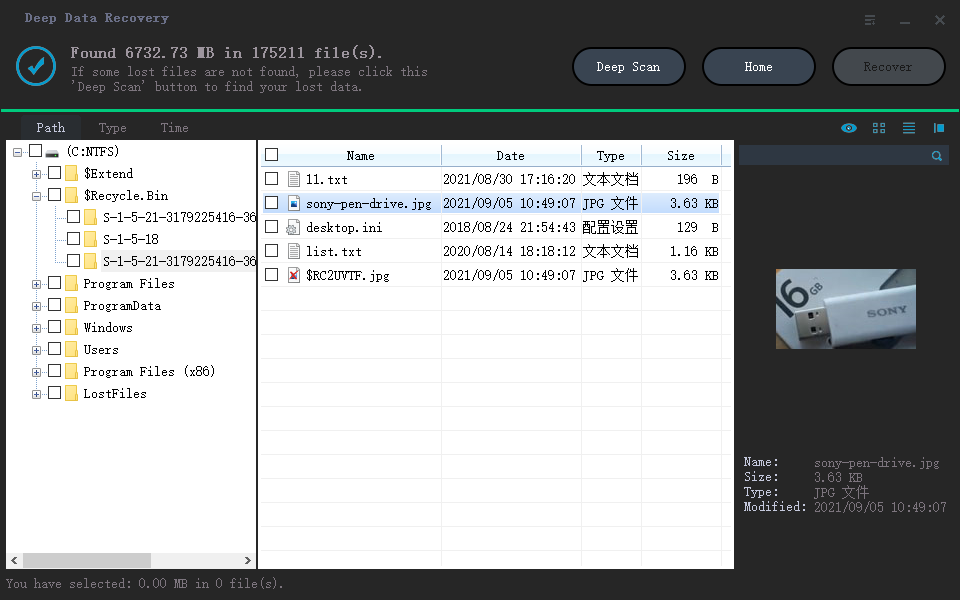
Step 4. Select the data you wish to recover and click "Recover". Choose a new location to store the files and click "OK".
Conclusion
BitLocker is a full-disk encryption feature that protects data on a Windows PC by encrypting the entire drive. If you need to remove or format a BitLocker-encrypted drive, you'll need to decrypt it first. This involves entering the correct recovery password, which can be found on a sticker on the drive or in the BitLocker settings on your PC.
To ensure your data security, we recommend unlocking the drive, backing up your data, and then formatting the BitLocker drive, USB, or SD card with ease.
To quickly format a disk, you can use either Qiling Partition Master or Windows File Explorer formatting for the simplest approach.
Related Articles
- [Full Guide] What Is Diskpart Command and How Do I Use It?
- How to Format USB/External Hard Drive to ExFAT [Windows & Mac]
- How to Move Partition in Windows Server
- How to Create A Partition Windows 11? [Solved]
- How to Install Windows 10 on GPT Partition in 2021
- Extend C drive or system partition in Windows 10